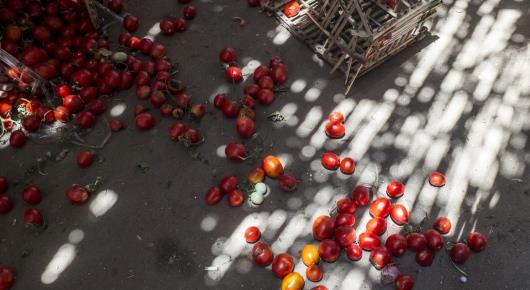FAO supports the reduction of food loss and waste in southeastern Europe

In Europe and Central Asia, and particularly in countries not part of the European Union, food loss and waste have major implications on food nutrition and security through inefficiencies in the food value chains. FAO is now working with four southeastern European countries to develop strategies for food loss and waste reduction.
The ultimate aim is to help Albania, Armenia, the former Yugoslav Republic of Macedonia, and Republic of Moldova increase the competitiveness of their agricultural sectors and improve sustainable natural resources management and climate change mitigation.
Under the regional implementation of FAO’s SAVE FOOD programme on food loss and waste reduction, national food loss and waste reduction strategies should be congruent with the specific needs of each country and with existing national strategies on agricultural development, food security, and climate change mitigation. The project will also develop a regional awareness-raising campaign, establish and coordinate a partnership network, and conduct training programmes in post-harvest handling practices and food and waste reduction.
“Food loss and waste reduce the availability of micronutrient-rich foods, reduce the incomes of smallholder farmers – who are the major food producers – and increase food prices for urban consumers,” said FAO agro-industry officer Robert van Otterdijk, who is leading the SAVE FOOD Initiative in the region. “Considering the lack of data on food loss and waste in these countries, FAO will assess post-harvest food losses in selected value chains under this project.”
As the first step, FAO experts visited the four participating countries to identify key actors in the food supply chain; understand the regulatory framework in the areas of food, agriculture and the environment; learn about the existing constraints that affect the functioning of the value chains; and understand the countries’ priorities and the resources required for agrifood chain development and reduction of food loss and waste. Meetings were held with government officials, representatives of the public and private sectors working in food and agriculture, academia, and civil society.
It was found that food losses in the horticultural value chains have occurred mostly due to inappropriate agricultural practices, poor road infrastructure and postharvest equipment facilities, and weak organization and cooperation among value chain actors. Climate volatility, together with poor planning and limited market access, make another major cause of low yields and high losses at harvest. Experts sought to understand the challenges that value chain actors face in their efforts to reduce food loss and waste at retail and consumer levels, and they learned more about policy barriers that hamper food donations to charities and food banks.
In the first quarter of 2019, multi-stakeholder round tables will be held and working groups formed in all participating countries to facilitate the development of comprehensive strategies on food loss and waste reduction.
In addition to reducing the availability of food, reducing incomes and increasing prices, food loss and waste unnecessarily and significantly contribute to greenhouse gas emissions and the negative effects of climate change. As such, food loss and waste constitute a vast, persistent and complicated problem that directly relates to the economy, people’s behaviour, social conditions, natural resources, and many other spheres.
5 December 2018, Budapest, Hungary
